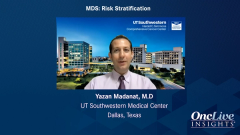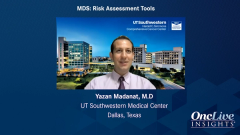
MDS Treatment: Patient Considerations
Drs Madanat and Sekeres discuss specific patient characteristics affecting selection of treatment for MDS.
Episodes in this series

Mikkael A. Sekeres, MD: Yazan, given the general tolerability of these drugs, are there patients in whom you wouldn’t use them with higher-risk disease? If so, how do you treat those patients?
Yazan Madanat, MD: Yes. That’s more of a rare occurrence. In general, I really try to incorporate HMA [hypomethylating agent] therapy. For patients who are reluctant, I usually try to offer them 1 cycle. There’s no harm in switching or stopping therapy if they don’t tolerate it, for quality-of-life reasons, or other reasons that the patient chooses not to go on therapy. There are quite limited options as standard of care to offer for those patients, so I give supportive management with blood checks and transfusion support. If they have some form of proliferative disease, I might incorporate low-dose Hydrea to just maintain the blood cell counts, not drop them too much, and then support their bone marrow with platelets and red blood cell transfusions.
You can always extrapolate from AML [acute myeloid leukemia] therapies if they’re not interested in clinical trials. I usually try to offer clinical trials up front for any patient with newly diagnosed MDS [myelodysplastic syndromes] when available. In the relapsed/refractory setting or post-HMA era, I check for targetable mutations. There are early clinical trial data for using enasidenib or ivosidenib in patients with MDS, and they seem to work OK. We don’t have many patients who were treated with them, but they might be an option to try to use off-label for those with no clinical trial options. But I try to limit my use of that, because we do have some trials available for those patients. It’s definitely an area of unmet need, whether up front or in the relapsed/refractory setting, so I tend to talk about clinical trials at any point in time when we’re switching therapy.
Transcript Edited for Clarity















































